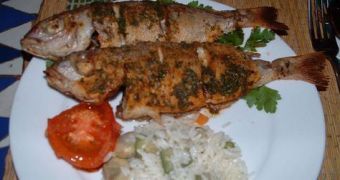Do you think that olive oil in the Mediterranean diet is the best? Well, it appears that you are wrong. A new research has found that fish oil, rather than vegetable oil in the diet, reduces the formation of chemicals called prostanoids, which in big amounts cause inflammation in many tissues and organs.
"Prostanoids help control blood pressure, fight allergies, and modulate inflammation, but too much of them - especially those made from vegetable oils - can also lead to increased pain, swelling, and redness in various tissues. Our study shows that prostanoids made from fish oil are less effective at causing pain and swelling than those made from vegetable oil and that adding fish oil to the diet decreases the amount of prostanoids made from vegetable oil," said lead researcher William Smith, Professor and Chair of Biological Chemistry at the University of Michigan.
Smith's team tested both oils in various levels in cultured cells. A relative increase in fish oil decreased the level of prostanoids from vegetable oil, but not always in the expected proportions. Oils are transformed into prostanoids through chemical reactions catalyzed by enzymes named cyclo-oxygenases (COX). There are two types: COX-1 and COX-2.
It appeared that fish oil binds strongly to COX-1, hampering the enzyme's action on vegetable oil, while this affinity does not exist for COX-2, so that a great amount of vegetable oil was still turned to prostanoids.
"This was completely unexpected. This new result shows that COX-2 does not 'prefer' fish oil to vegetable oil. Regardless of the amount of extra fish oil that we added, COX-2 still helped convert all the vegetable oil available," said Smith.
This discovery is a novelty, showing how the body naturally regulates amounts of prostanoids resulted from fish and vegetable oil. In the presence of both oils in the diet, levels of prostanoids from fish oil will commonly overcome those coming from vegetable oil, but COX-2 can balance this. The team is now trying to detect why COX-1 and COX-2 act differently.
One hypothesis is that since COX-2 has two binding sites, it can bind to both types of oils. When fish oil binds to one of the two sites, it may enhance the other's site affinity to vegetable oil, a phenomenon named allostery.
Future research could create drugs that bind to COX-2 and fight the vegetable oil prostanoids.
"The drugs that are currently used to inhibit COX-1 and COX-2 provide relief from the symptoms of inflammation and pain, but they still have many side effects. By better understanding how prostanoids work at the cellular level, we hope to find new ways to regulate inflammation and create better anti-inflammatory drugs," said Smith.

 14 DAY TRIAL //
14 DAY TRIAL //